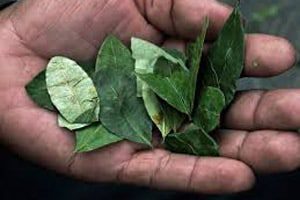
The government of Colombia has announced it will stop using the controversial herbicide glyphosate to destroy illegal plantations of coca. Coca is the raw ingredient for cocaine. The decision came after a recent warning from the World Health Organization (WHO) that glyphosate is “probably carcinogenic,” the BBC reports. Glyphosate has been used in crop-spraying anti-narcotics […]

Colombia to Stop Using Glyphosate in Coca Crop Programs
The government of Colombia has announced it will stop using the controversial herbicide glyphosate to destroy illegal plantations of coca. Coca is the raw ingredient for cocaine.
The decision came after a recent warning from the World Health Organization (WHO) that glyphosate is “probably carcinogenic,” the BBC reports. Glyphosate has been used in crop-spraying anti-narcotics programs in South America sponsored by the U.S.
Columbian President Juan Manuel Santos has said his country must find other mechanisms to combat coca production. Anti-narcotics officials in Colombia will have until October to prepare an alternative plan. “I am going to ask the government officials in the National Drug Council at their next meeting to suspend glyphosate spraying of illicit cultivations,” President Santos announced, according to the BBC. Santos said “recommendations and studies reviewed by the Ministry of Health show clearly that yes, this risk exists.” Santos made reference to the WHO warning on cancer. But the president said Colombia will not “lower the guard” in combating drug trafficking.
The Colombian drug eradication program began in 1994, targeting mainly areas controlled by the country’s largest rebel group, the Farc, the BBC reports. Officials say the Farc uses the income from cocaine production to finance its armed struggle.
Ecuador and Peru, other significant coca-producing countries in the region, have also used the herbicide to destroy coca fields. Colombian farmers maintain that aerial fumigation has destroyed entire fields of coffee and other legal crops.
In March, the International Agency for Research on Cancer, the cancer research arm of the World Health Organization, said that glyphosate, a broad-spectrum herbicide widely used since the 1970s (sold in the U.S. under the brand name Roundup), “probably” causes cancer in humans. In addition, glyphosate has been shown to cause such other adverse health effects as respiratory distress, impaired consciousness, pulmonary edema, arrhythmias, and renal failure, according to a 2004 study published in Toxicology Review. When glyphosate is sprayed from the air, the chemical can drift to nearby areas, contaminating soil and water. Residents can inhale or come into contact with the chemical.
In a major agricultural area in Argentina, residents have demanded action on the high cancer death rates, which they believe are linked to agricultural chemicals, in particular glyphosate. Nearly half of all deaths in the town of San Salvador in recent years have been caused by cancer, which is a far higher rate than the national average of 18 percent, according to the Buenos Aires Herald. Environmental and epidemiological experts are collecting and analyzing data to establish whether there is a connection between the agricultural chemicals and high rates of cancer.


